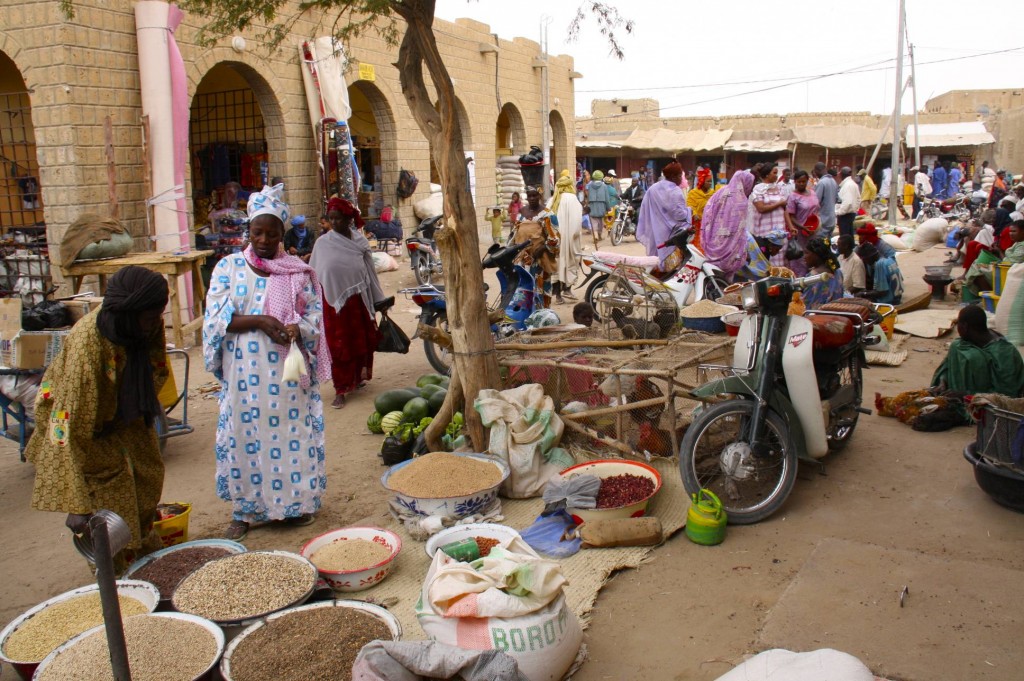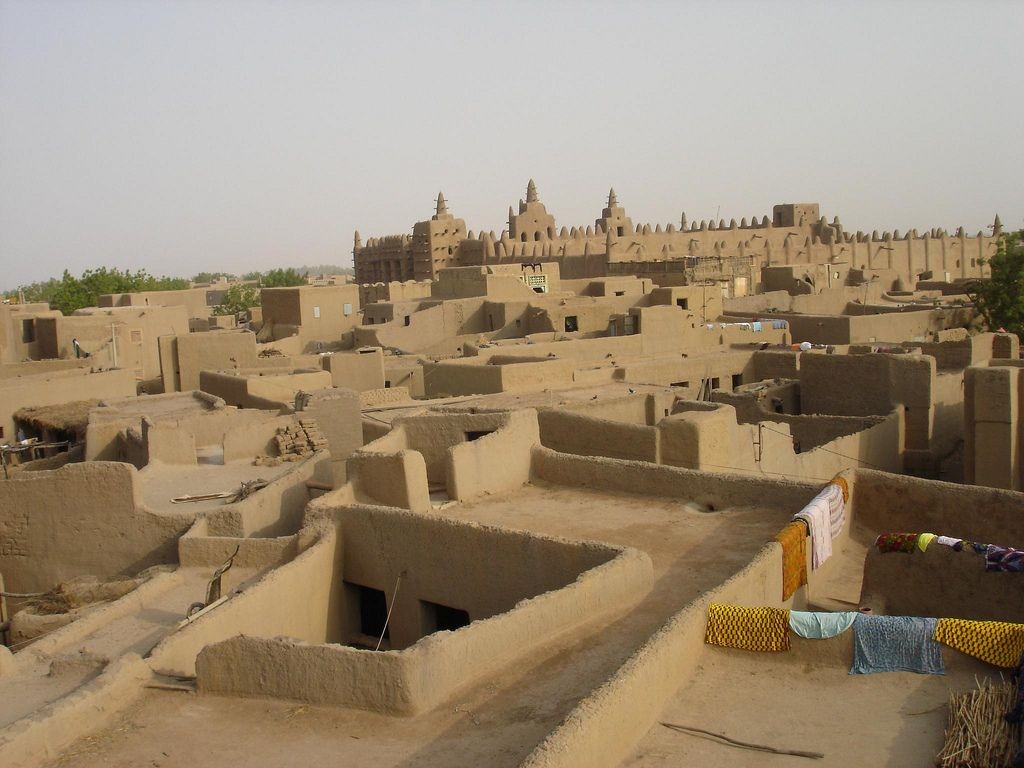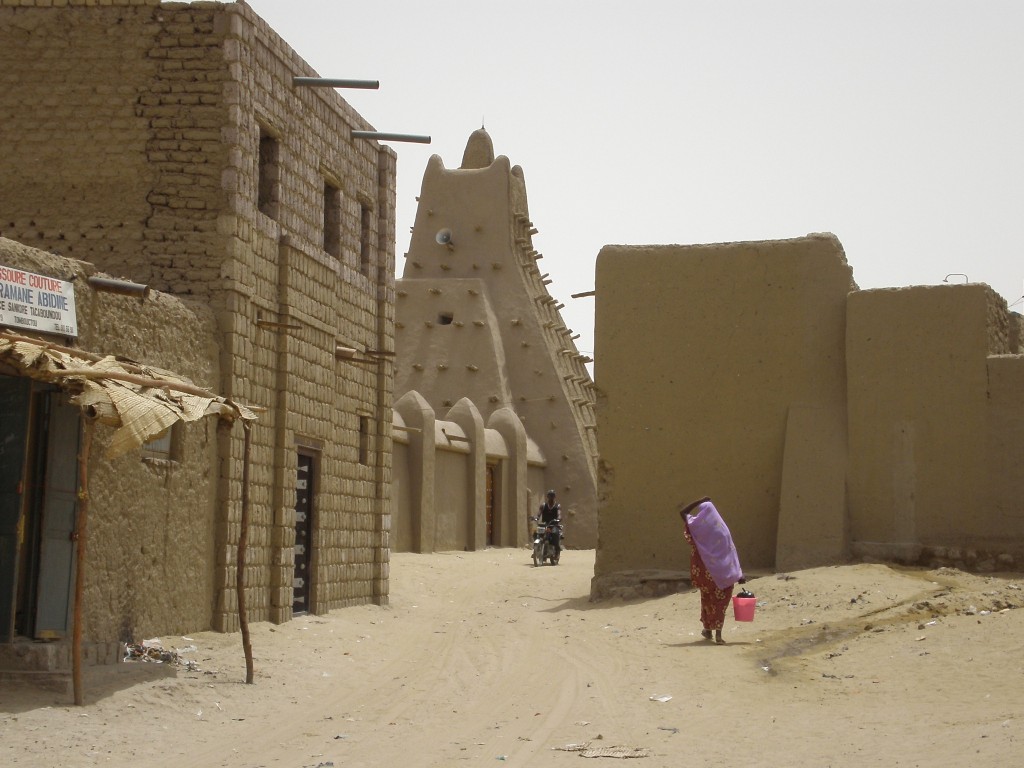 Something made me think of Timbuktu, today. For a moment, I could smell the wind-blown sand, the acacias, the drying dung. For a moment I could hear snorting camels, the rapidfire street-talk in Chiini, the wailing muezin, the griots playing gurkels and koras, the slender Fulani traders walking like gods through the market place, jaunty in their conical hats. Fabled Tombouctou, the name itself has come to mean “far away and unreachable”. Sad Timbuktu, the fading shadow of an ancient greatness.…“Salt comes from the north, gold from the south, but the wealth of wisdom comes from Timbuktu.” Few can now read the manuscripts from its centuries-old libraries, and the children who tumble out of the Lycée may not care about their loss. Outside the city, the monstrous sand dunes march southward, threatening to swallow what’s left of the city, like so many others that have sunk and drowned and vanished into the sand sea. Years of war among the desert nomads, ended only by uneasy truce in the late nineties, did not do it any good. Nor did decades of exploitation and brutality by a parasitic Marxist aristocracy, before that.
Something made me think of Timbuktu, today. For a moment, I could smell the wind-blown sand, the acacias, the drying dung. For a moment I could hear snorting camels, the rapidfire street-talk in Chiini, the wailing muezin, the griots playing gurkels and koras, the slender Fulani traders walking like gods through the market place, jaunty in their conical hats. Fabled Tombouctou, the name itself has come to mean “far away and unreachable”. Sad Timbuktu, the fading shadow of an ancient greatness.…“Salt comes from the north, gold from the south, but the wealth of wisdom comes from Timbuktu.” Few can now read the manuscripts from its centuries-old libraries, and the children who tumble out of the Lycée may not care about their loss. Outside the city, the monstrous sand dunes march southward, threatening to swallow what’s left of the city, like so many others that have sunk and drowned and vanished into the sand sea. Years of war among the desert nomads, ended only by uneasy truce in the late nineties, did not do it any good. Nor did decades of exploitation and brutality by a parasitic Marxist aristocracy, before that.
Why do memories come flooding so strongly? Because I hear from the BBC that Ali Farka Touré has died of cancer. Touré is Timbuktu’s most famous modern son, one of the great musicians of the world. Though raised in the tradition of classical Malian music, he learned to play the guitar at the age of six, and subsequently absorbed the influences of American bluesmen like Big Joe Williams, John Lee Hooker, and Lightnin’ Hopkins. Even Hendrix. With tremendous artistry and panache, he folded these wayward musical descendants of Mali back into their ancestral core, producing a highly personal kind of blues that is best described as “serene”. Blues without suffering or self-pity.
He was the last and only surviving of ten sons, from a small village on the Niger. His parents nicknamed him Farka (donkey) because of his stubbornness. His family mixed the uneasy ethnic factions of the region, and he took care to sing and record in Songhai, Temazhek, and Fulfulbe even at the time when the speakers of these languages where at war. He was a humane and sensitive man, as well as a great musician. He did not follow the well-worn path to success and comfort in London and Paris that has lured so many African stars. Instead, he stayed in Mali through hard times, and ended as mayor of a small town, hoping that he could use his fame to bring some good to people on a visible, human scale.
 So tonight, I’m playing through his albums, and letting the sights and sounds and smells blow over me, like the hot sands in the harmatan wind.
So tonight, I’m playing through his albums, and letting the sights and sounds and smells blow over me, like the hot sands in the harmatan wind.
Why am I sitting in an apartment, my legs and wrists cramped from tediously filling out Excel tables, licking my wounds from crappy, vicious human beings, when I could be in the Sahara again? I could be. I’m in bad shape, flabby, worn down by frustration and betrayals. But I could go back if I worked up the nerve.

0 Comments.